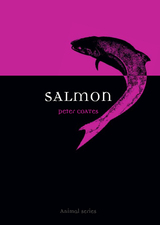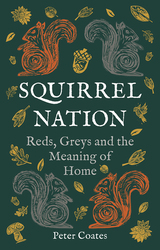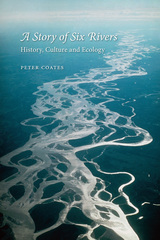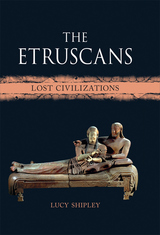3 books about Coates, Peter

Salmon
Peter Coates
Reaktion Books, 2006
Every year, wild salmon travel hundreds of miles upstream. They fight fierce river currents, leap over rocks and small waterfalls, and die by the thousands of starvation, disease, and exposure to cold. Even if they surmount these obstacles, the fish risk becoming dinner for hungry predators like bears, birds, and humans. Guided by a keen sense of smell, the survivors travel to their original hatching grounds, where they breed, spawn, and quickly die.
Salmon reveals this amazing life cycle to be just part of the larger story of these fascinating fish. The cultural life of salmon, Peter Coates explains, is rich with myths about “the king of fish,” from lands as diverse as Nova Scotia, Norway, Korea, and California. Coates’s history details the salmon’s cherished symbolic meaning as well as its current status as the ignoble product of fish hatcheries. Encompassing evolutionary, ecological, and cultural perspectives, Salmon is the perfect book for anyone who has ever eaten or tried to catch this delightful—and delectable—fish.
Salmon reveals this amazing life cycle to be just part of the larger story of these fascinating fish. The cultural life of salmon, Peter Coates explains, is rich with myths about “the king of fish,” from lands as diverse as Nova Scotia, Norway, Korea, and California. Coates’s history details the salmon’s cherished symbolic meaning as well as its current status as the ignoble product of fish hatcheries. Encompassing evolutionary, ecological, and cultural perspectives, Salmon is the perfect book for anyone who has ever eaten or tried to catch this delightful—and delectable—fish.
[more]

Squirrel Nation
Reds, Greys and the Meaning of Home
Peter Coates
Reaktion Books, 2023
A wide-ranging meditation on belonging and citizenship through the story of two squirrel species in Britain.
Squirrel Nation is a history of Britain’s two species of squirrel over the past two hundred years: the much-loved, though rare, red squirrel and the less-desirable, though more populous, grey squirrel. A common resident of British gardens and parks, the grey squirrel was introduced from North America in the late nineteenth century and remains something of a foreign interloper. By examining this species’ rapid spread across Britain, Peter Coates explores timely issues of belonging, nationalism, and citizenship in Britain today. Ultimately, though people are swift to draw distinctions between British squirrels and squirrels in Britain, Squirrel Nation shows that Britain’s two squirrel species have much more in common than at first appears.
Squirrel Nation is a history of Britain’s two species of squirrel over the past two hundred years: the much-loved, though rare, red squirrel and the less-desirable, though more populous, grey squirrel. A common resident of British gardens and parks, the grey squirrel was introduced from North America in the late nineteenth century and remains something of a foreign interloper. By examining this species’ rapid spread across Britain, Peter Coates explores timely issues of belonging, nationalism, and citizenship in Britain today. Ultimately, though people are swift to draw distinctions between British squirrels and squirrels in Britain, Squirrel Nation shows that Britain’s two squirrel species have much more in common than at first appears.
[more]

A Story of Six Rivers
History, Culture and Ecology
Peter Coates
Reaktion Books, 2013
Many of the world’s major cities sprang up on the banks of rivers. Used for water, food, irrigation, transportation, and power, rivers sustain life and connect the world together, but most of us think of them simply as waterways that must be crossed on the way to another place. Using four European and two North American rivers as examples, A Story of Six Rivers considers the place of rivers in our world and emphasizes the inextricable links between history, culture, and ecology.
Peter Coates explores six rivers, chosen as examples of the types of rivers found on the planet: the Danube, the second-longest river in Europe; the Spree, which flows through Berlin; the Po, which cuts eastward across northern Italy; the Mersey in northwest England; the Yukon, which runs through Canada and Alaska; and the Los Angeles in California. Creating a series of river biographies, Coates gives voice to each of these bodies of water, exploring how rivers nurture us, provide cultural and economic opportunities, and pose threats to our everyday lives. He challenges recent narratives that paint rivers as the victims of abuse, pollution, and damage at the hands of humans, focusing on change rather than devastation. Describing how humans and rivers form a symbiotic—and sometimes mutually destructive—relationship, Coates argues that rivers illustrate the limits of human authority and that their capacity to inspire us is as strong as our ability to pollute them.
An intimate portrait of the way these bodies of water inform our lives, A Story of Six Rivers will make us reconsider the streams and tributaries we traverse each day.
[more]
READERS
Browse our collection.
PUBLISHERS
See BiblioVault's publisher services.
STUDENT SERVICES
Files for college accessibility offices.
UChicago Accessibility Resources
home | accessibility | search | about | contact us
BiblioVault ® 2001 - 2024
The University of Chicago Press









